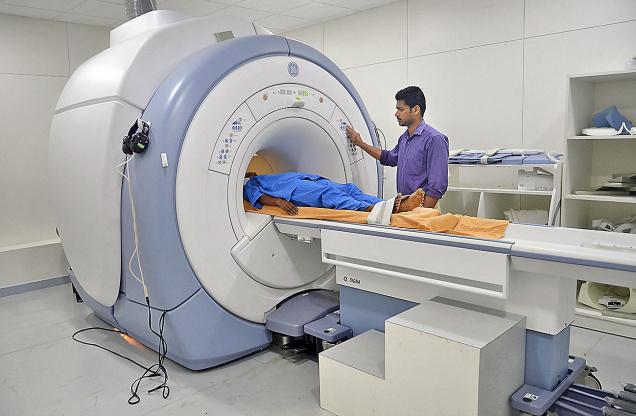What Is Magnetic Resonance Imaging or MRI?
An MRI is a special diagnostic scan that combines radio frequency waves with an intense magnetic field. The purpose of an MRI scan is to provide detailed images of the internal tissues and organs. There is zero radiation involved in this medical service. MRI scans are extremely useful for detailing body parts that do not show up well on X-Ray.
This test is commonly used to provide information on health and well-being of the following tissues:
* Joints, Wrists, Ankles
*Skeleton
*Intervertebral discs in the spine
* The brain
*Lungs
*Tendons and ligaments
*Heart and circulatory system
*Eyes
*Ears
*Abdomen
*Pelvis
*Cartilage
What to Expect
A Magnetic Resonance Imaging scanner is a large round magnet that typically has a tunnel in the center. Patients lay on a sliding table that places them into the tunnel. Some clinics have scanners that consist of larger openings to help individuals with claustrophobia feel secure and you can find more information and videos about this on the Affidea website.
The patient lies still during the exam. Radio waves are responsible for manipulating the magnetic position of the atoms in the body. A strong antenna picks up this information and sends it to a computer to be translated. Miraculously, after performing millions of equations, the computer produces black and white cross-sectional images of the body. These images can be further converted into 3-dimensional pictures to help isolate any health concerns.
Why Book a Private Scan?
Unfortunately, waiting for your hospital to book you in for a diagnostic MRI can take a long time, depending on how many people are in need of this detailed information. Private clinics are often open on evenings and weekends. They have a much faster turnaround rate. You may be able to book your scan within 24 to 48 hours. This medical service is available out of pocket in numerous locations.

Obviously, with some health concerns such as cancer or brain tumors, time is of the essence. Your doctor can recommend treatment much faster when they have accurate information on hand. Your health is priceless. Waiting weeks or months to have the test done in a traditional hospital setting can cause you extra stress and prevent you from acquiring the care you need as fast as possible.
Preventable Screening with MRI
Some people have a strong family history of certain ailments. Due to the genetic possibility of requiring care themselves, many decide to be proactive in their health and book a preventable screening MRI. This is also common for individuals who are monitoring their health after going into remission from a disease process. Finding out if there is any cause for concern early on, can help your body have a head start as far as treatment goes. It can also provide you with a tremendous peace of mind.
Popular Preventable Screening Tests Include:
*Lung Scan
*Breast MRI
*Heart Scan
*Virtual Colonoscopy
*Coronary CT Angiography
Who Is Eligible For an MRI?
People of all ages have MRI scans, however, the following situations need to be taken into consideration. Due to the magnetic forces, certain metals in your body may make this procedure not an option.
*Cochlear and inner ear implants
*Certain neurological stimulators
*ICD or implantable cardioverter-defibrillator
*Cardiac pacemakers
*Drug pump implant
*Particular metal aneurysm clips in your head
*Penile implants
*Tubal ligation clips
*IUD or intrauterine device
*Some metallic heart valves
*Surgical staples or clips after surgery
*Metal fragments in your eye
*Dental fillings or bridge work
If you do have a cardiac pacemaker or some other metal inside of your body, it does not necessarily mean that you cannot undergo an MRI scan. It is vital, however, that the staff conducting the exam is aware of any metal ahead of time. A cardiologist will need to make sure your components are safe prior to the procedure. As well, extra monitoring may be required to ensure patient safety.
Frequently Asked Questions:
How Safe Is An MRI?
There are no known side-effects to this painless procedure.
Pregnancy
Pregnant women do not typically undergo an MRI procedure; particularly during the initial trimester. However, there is no evidence that states this test poses a risk to mother or baby.
What About My Dental Work?
MRI scans can still be carried out successfully on patients who have dental work.
Metal Objects Can Interfere With the Exam
Do not bring any of the following items into the exam room with you. Metal objects not made of steel or iron can still interfere with the exam.
*Jewelry
*Dentures or Partial Plates
*Watches
*Coins
*Hearing Aids
*Keys
















